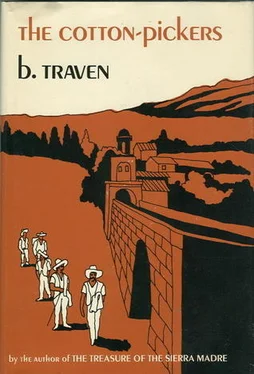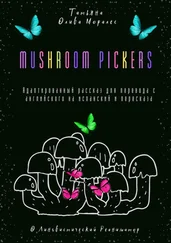B. Traven - The Cotton-Pickers
Здесь есть возможность читать онлайн «B. Traven - The Cotton-Pickers» весь текст электронной книги совершенно бесплатно (целиком полную версию без сокращений). В некоторых случаях можно слушать аудио, скачать через торрент в формате fb2 и присутствует краткое содержание. Год выпуска: 1969, Издательство: Hill and Wang, Жанр: Проза, на английском языке. Описание произведения, (предисловие) а так же отзывы посетителей доступны на портале библиотеки ЛибКат.
- Название:The Cotton-Pickers
- Автор:
- Издательство:Hill and Wang
- Жанр:
- Год:1969
- ISBN:нет данных
- Рейтинг книги:3 / 5. Голосов: 1
-
Избранное:Добавить в избранное
- Отзывы:
-
Ваша оценка:
- 60
- 1
- 2
- 3
- 4
- 5
The Cotton-Pickers: краткое содержание, описание и аннотация
Предлагаем к чтению аннотацию, описание, краткое содержание или предисловие (зависит от того, что написал сам автор книги «The Cotton-Pickers»). Если вы не нашли необходимую информацию о книге — напишите в комментариях, мы постараемся отыскать её.
—Book World
The Cotton-Pickers — читать онлайн бесплатно полную книгу (весь текст) целиком
Ниже представлен текст книги, разбитый по страницам. Система сохранения места последней прочитанной страницы, позволяет с удобством читать онлайн бесплатно книгу «The Cotton-Pickers», без необходимости каждый раз заново искать на чём Вы остановились. Поставьте закладку, и сможете в любой момент перейти на страницу, на которой закончили чтение.
Интервал:
Закладка:
All along the railroad the zopilotes, the vultures, squatted and waited for victims — dead burros, dogs, cats, pigs. On upland plains or coastal flats long stretches of the railroad served also for caravans of burros and mules, for the adjacent road was often swallowed by bush or rainy-season floods.
The railroad was mainly of one track. Large water towers, wooden tanks on trestles, had been erected about every twenty miles so that the engines could refill. At many small stations the train seldom came to a full stop. A mail bag would be slung out and another one shot in. Some ice blocks, which were packed around with wood shavings to retard melting and then sewn into burlap, were simply tossed out for the consignee to pick up.
Tickets could be bought at the various stations or on the train, costing 25 percent more on the train; an extra charge which didn’t apply, however, if a station had no ticket office. Many stations weren’t expected to sell tickets after five in the evening, in order that the ticket clerk be spared having money in his isolated office after dark, a thing which could cost him his life. After dark the tickets cost the normal price aboard the train. En route, the tickets were collected by a conductor who then tucked a small tab inscribed with the code of destination into the passenger’s hat band, thus keeping account of his many passengers.
The soldiers usually sat about with their first-grade primers, trying to learn to read. They were all Indians and very few of them could read or write, but they were consumed with an ambition to learn. One would help the other, and when one had learned to write eso he would be full of eagerness to pass his accomplishment onto his fellows.
About eight o’clock our train stopped for breakfast at a station which looked almost like a lively township. Mr. Pratt and I got off the train and entered a typical station buffet — Chinese café, of course. In fact, it was hard to find an eating place anywhere that wasn’t Chinese.
After breakfast we walked up and down the platform where dozens of hawkers swarmed, offering things you’d never have expected to find for sale on a railroad platform: parrots, tiger cubs, skins of grown tigers, live iguanas, flowers, song birds in handmade wicker cages, oranges, tomatoes, bananas, mangoes, pineapples, sticks of sugar cane fresh from the field, candied fruits, tortillas, roast chicken, smoked fish, boiled giant crabs; bottles of coffee, lemonade, beer, wine, pulque. Ragged, barefoot Indian girls ran along the train to offer themselves as servant girls or cooks in households.
For the twenty-odd minutes of the train’s stop, the station was like a fairground. Except for our train and the evening train, it dozed in a dead calm, but now it was enough to make your head spin. A freight train might come through and cause a slight stir among the railroad employees; but, without passengers getting on and off, the station was torpid and sleepy. Most of its of its daily life was centered on those lively twenty minutes or so when the morning train stood there; and any vendor who failed to do business during that time had failed for the whole day.
At noon we arrived at a bigger station where we stopped for about forty minutes for the midday meal. In the station buffet thirty places were already laid on several big tables and half the plates were already filled with soup, for a quick glance was enough to tell the proprietor how many diners to prepare for. Then came the long, long exhausting afternoon through jungle, prairie like grassland, and bush. The train from the opposite direction that crossed with us at noon had brought the morning papers from the nearest city and these were sold on the train.
At nine in the evening we got out at Mr. Pratt’s little home station. We stopped at the cantina, which was also the local post office. Mr. Pratt greeted the cantina owner, a Señor Gomez, and introduced me.
Regular cooked meals weren’t to be had in a place like this, but you didn’t have to go hungry; you could in fact get a wonderful meal together. We bought a can of Vancouver salmon, a few cans of Spanish sardines in fine olive oil, a few cans of Vienna sausages (made in Chicago), a package of Kraft cheese, and some crackers. There were no bread or rolls. Bread doesn’t keep well in that climate; it turns hard, gets moldy, or is attacked by small red ants.
With our canned snack we had bottles of Señor Gomez’s beer, and then went to work on his stock of tequila. After a while we were dead to the world, if not ripe for burial; so we went into the cantina’s poolroom, ourselves in our blankets, and lay down on the floor to sleep. Señor Gomez had a softer bed. He went to his wife.
Thinking of a woman or of women in general — I can’t remember which — I fell asleep; and by one woman in particular, I was awakened the next morning. The woman in question was Mrs. Pratt. She had driven the Ford in from the ranch to do some shopping at the cantina and there she found her husband, though she hadn’t expected him, least of all on the floor of the poolroom, and in a well-soaked condition.
Since the beginning of time, the innocent have had to suffer. I was innocent, so I had to suffer. Mr. Pratt was the model husband, but I — whom he’d picked up in the gutter — was the bum who had tempted and beguiled him and led him astray.
For he, the good Mr. Pratt, would never have done such a thing on his own. Oh, no! As we were leaving, Mr. Pratt gave Señor Gomez a wink. Men always understand a wink, particularly if the two men who share the wink are married men trying to live in peace with their wives.
“Well,” declared Gomez, “you had so-and-so many cans of sardines, and the sausages, and cheese," — again the wink — “and you had two small bottles of beer, and Mr. Gales had four and three tequilas. That does it. I’ve chalked up the drinks on your bill.”
Mrs. Pratt was well satisfied with her husband. (He could settle with Gomez later for the twenty or thirty bottles we’d tossed into the corner of the room. His credit with Gomez was very good.) But I got such a dirty look from Mrs. Pratt that I seriously considered canceling the contract then and there. For I had to spend at least two weeks in Mrs. Pratt’s house, while we were cutting out the herd for the drive, and what couldn’t this lady do to me in that time?
Just think of it. I’d got her good, sober husband into such a condition that even now after several hours’ sleep he was bleary-eyed and could hardly stand up straight. It’s unwise to go drinking with married men. It never does any good. They’re a race apart.
So I was quite relieved when Mrs. Pratt shoved her customarily sober husband into the Ford, seated herself behind the steering wheel, started up, and clanked off. That I was hired to go along with them didn’t seem to worry her — let the bum walk. But the thought of the fourteen miles from the station to the ranch gave me such impetus that, as Mrs. Pratt was turning onto the main road, I sprinted after the Ford and dove head first into the open trunk. My dive, however, hadn’t been deep enough to get all of me into the trunk, so that a good part of my length, legs and all, dangled outside. I suspect that the Indian workers along the way must have thought that I was a tailor’s dummy which Mrs. Pratt had picked up at the station; or they may have thought that Mrs. Pratt had run over me and was transporting me out of sight to the ranch to be buried there.
When we arrived at the ranch no one took any notice of me. Mrs. Pratt drove the Ford into a thatched barn and went into the house with her husband, leaving me still sticking part way out of the trunk. After a while I dragged myself out of my uncomfortable position and moved into the upholstered front seat.
Читать дальшеИнтервал:
Закладка:
Похожие книги на «The Cotton-Pickers»
Представляем Вашему вниманию похожие книги на «The Cotton-Pickers» списком для выбора. Мы отобрали схожую по названию и смыслу литературу в надежде предоставить читателям больше вариантов отыскать новые, интересные, ещё непрочитанные произведения.
Обсуждение, отзывы о книге «The Cotton-Pickers» и просто собственные мнения читателей. Оставьте ваши комментарии, напишите, что Вы думаете о произведении, его смысле или главных героях. Укажите что конкретно понравилось, а что нет, и почему Вы так считаете.











